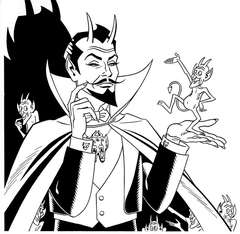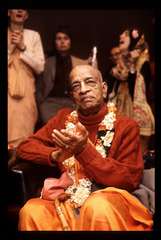asa[e] - VAD, Sannyasa Dharma, Advisor
Dear Maharaj,
PAMHO AGTSP!
I wanted to write to you to ask your guidance on where to go from here. Next year I can pursue college as you expressed. Until then I can pursue martial arts as you guided. But before I start martial arts, I need to wrap up previous projects. I wanted to ask your guidance on an alternative place to stay? People where my parents stay ask awkward questions to which we don’t have answers to yet.
YAS,
YS
HpS/ASA - AgtSP! paoho.... We are relating to the physical and mental world through a 75-year old California body. At 30-years old the physical energy in the body starts to diminish. At fifty the mental. We can only relate to specific planning, mental plans, by writing stuff down. We can write this kind of letter because we can write and re-write it. Focus on one "local" plan.
Very funny, very fascinating.
Same will happen to you, everyone.
As your body doesn't jump and hop, mind the same, you begin to realize that you are not body or mind.
Then, "Who am I"? Because we have spiritual resources we can, and are gratefully pushed, to realize our intellectual (Buddhi) nature.
Hmmm. How is my intelligence? What is my attitude to life? Bhava? Most people never really ask this question. They just accept the attitude to life that their culture, Disney, Netfixs, gives them.
If we get the Bhava, perspective, that BG gives us, then we can reawaken our spiritual nature and go to dance in Goloka.
Cha! Cha! Cha! ....
-0-0-0-
So, often people ask us for specific advise. We can give general suggestions and focus on a few specific situations, but without knowing the specific details, we cannot give detailed advice, Eg. In which city to live, what career to take.
It just bewilders us.
We feel like a buffalo looking at a person sitting in front of us on a motorized lawn mower, honking their horn and waving at us to move.
""Hu????"
We wrote about this topic two days ago: https://monkeywarrior.com/detail/14018/, please read that post, it should help.
We get this question often and try to explain our limits. As Mangala-ananda Das told us, "After seven or so years as your disciple, I have figured out that you are my guru, not my psychologist".
We feel bad because we would like to study every situation and help, but it is just not possible. We are not the supreme enjoyer, proprietor or FRIEND. The last mistake got Maharaja Bharata and Adam, husband of Eve.
We were pushed into Sannyasa by many intelligent people. O.K. Then we realized that it meant going beyond Kuticaka, living in a Temple cave near the Temple and just taking food from that Temple and giving advice. The administrators had some expectation that you would give advice that would be comfortable to their administrative ambitions. Oooof!
So, we took to Parivrajacacary.
We had stayed in Kolkatta helping our esteemed Sannyasa guru and Sankirtan leader, H. H. B. S. Damodara Swami, develop the Second World Congress for a Synthesis of Science and Religion for over a year. It had been my first summer in India and the hottest one in Kolkatta in 35-years. We lost 20-pounds, were so weak we had to be careful walking that we did not fall down. Yet, we still went out on Indian buses to do Sankirtan! Jay!!
Severe austerities for the B.I.
We had promised to stay for three months.
We did.
Maharaja asked to stay another three months.
.. . . . ... We DID.
Then he asked for another three months and
. . . . We D I D ! !
Then... yes, he asked again (each time by phone), please stay just a little longer. 'Don't always run away'!
Oooof!!!
We stayed and worked.
Then Maharaja, my Sankirtan leader, came to India, and the Congress was scheduled to start etc.
He was critical of how many contacts that we had been able make etc. etc.
We were very hurt. Whine. Whine. Whine. We had gone way beyond what he had asked. We had tried our, agree limited, best, and then he was criticizing us.
Ooof.
After about one-hour he came out of his room smiling and said, "Come here". I went into his room and he showed me some documents in his suitcase that he was unpacking. From the Kolkatta weather they had gotten so damp, they were sticking together, and one Brahmacari was very carefully pulling them apart so that they were not destroyed.
He laughed and said that he had to make a very serious apology to me, that he had forgotten (he was a graduate student in Kolkatta for many years) what it was like in Kolkata.
I was happy.
Often ISKCON leaders would be overly critical of us and never apologize. Between myself and Maharaja I feel a very intimate friendship. We hope to see him soon!
Yet, he is not God. He made mistakes. He could not give perfect advice.
If you want perfect career advice, you must talk with God. Srila Prabhupada, and They may say, that even they don't know.
The Jiva's have free will, and because of that they can do delightful never before dreamed of things that charm Radha and Krsna. We are all special. Unique, of inestimable value.
I could go on with this theme.
It describes how we scrounged a ticket back to USA. To leave Kolkata we had to duck under Maharaja's radar as more and more and more people were coming to organize this Congress etc. We arrived in New York in the middle of Winter and two feet of snow. No place to stay but on the street.
We just would not compromise with any of the Temples we knew to get a place to stay in exchange for being an "accommodating" Sanyasis.
We called Shankar Shastri and he was happy for us to stay for a few days, but beyond that it would interrupt his life style.
In the end we were determined, as must be you, and anyone seeking to become a Goswami and then a pure devotee, that we would rather die than lie to people about the truth.
Eg. "Prabhu, I know that you are Temple President, GBC Secretary, rich man, but I have to say that on this point you are wrong. You are being to arrogant with the devotees in this situation".
So, I was thinking that I would just go and sit behind a tennis back-board in a school athletic yard and freeze to death with honor and be found in the Spring thaw.
Then, little by little, Krsna revealed a plan for preaching and traveling for the next three months.
O.K. That's all we had, but that's enough.
!!!! Chant good rounds. Read Prabhupada's books. Talk with six good devotees who know you and then see if Krsna wants you here or in Goloka. If He wants you here, maybe the best he can do is give you a plan that will take you up: O.K. He has not given me an ultimate plan, but He has given me a career move that will have some immediate results and put me in a better position to take advantage of opportunities in the future. !!
You see we have taken a lot of time to answer your question.
Before this Blog we would have had to write this letter seven times each year!
Now we feel that we have done the best for many other devotees, because we can answer your excellent question, but for many other also!
O.K.???
We are facing exactly the same challenges as you right now.
We are trying to clarify what is going to happen with NIOS etc.
We are doing our work. We visited all of our work stations for six months. Now we are back in Kishkindha and we are trying to understand Krsna's next plan of work. Really, it is very possible that Krsna wants us to abandon this body and mind and go to work in another planet.
-0-0-0-
As we understand many devotees, including us, had the same question wen Tamal Krsna Swami died in the car accident, "Oh, Prabhupada, how could you let this happen"?
"I need him for other work here. I let him stay with you for as long as possible. If you did not take advantage of him that is your fault, not mine".
Unless we accept that Sankirtan may kill us, Maya will always have us under her control.
Visnu priya was just as good a Goswami as Lord Caitanya.
Tell us the opinion of others about your situation, the insights from your chanting. Citations from your readings of SP's books that related to your decision making.
O.K. We look at a few more letters.
The go rake leaves!
Thank you!!
Expect to hear great results from your war on Maya!
JHpS - ASA







